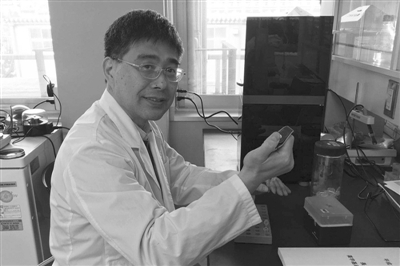"Fourth therapy" brings new hope to cancer patients - Nagasaki University Associate Professor Bei Lihai Xiong talks about cancer immunotherapy
"Fourth therapy" brings new hope to cancer patients - Nagasaki University Associate Professor Bei Lihai Xiong talks about cancer immunotherapy
January 22, 2018 Source: Science and Technology Daily
Window._bd_share_config={ "common":{ "bdSnsKey":{ },"bdText":"","bdMini":"2","bdMiniList":false,"bdPic":"","bdStyle":" 0","bdSize":"16"},"share":{ }};with(document)0[(getElementsByTagName('head')[0]||body).appendChild(createElement('script')) .src='http://bdimg.share.baidu.com/static/api/js/share.js?v=89860593.js?cdnversion='+~(-new Date()/36e5)];
Professor Bei Lihai, a professor in the test, Chen Chao, a reporter
Today's point of view
Since 2013, Science magazine ranked cancer immunotherapy as the first major scientific breakthrough in the world, this therapy has become one of the most popular and exciting subversive technologies in biomedicine. The reason why it is a revolutionary breakthrough is that compared to traditional chemotherapy and targeted therapy, the essential difference is against immune cells, not cancer cells. These new therapies become a weapon to attack cancer cells by activating or modifying the immune system's anti-tumor immunity.
Dr. Kitamura, Professor of the Department of Medical and Dental Medicine, National University of Nagasaki, is an expert in microbiology, immunology, gene therapy, antiviral, anticancer drug development and pharmacology, and has been involved in Japanese gene therapy. The project successfully developed the first viral vector for gene therapy in Japan. The vector technology has been patented by major countries in the world and clinical trial research is being carried out in Japan. In addition, it is also engaged in the study of the molecular mechanisms of the intestinal flora and its products on the immune response and regulation of cancer. A few days ago, Bei Li Haixiong was interviewed by the Science and Technology Daily reporter and gave a comprehensive introduction to the progress of cancer immunotherapy.
Cracking the immune escape mechanism of cancer cells
Kita said that the three traditional treatments for cancer treatment are surgery, radiotherapy and chemotherapy. Immunotherapy is the fourth treatment that has attracted much attention in recent years. Cancer immunotherapy is a general term for several immunotherapeutics, each with different treatment principles and agents. The two most popular therapies currently include immunological checkpoint inhibitor therapy and chimeric antigen receptor T cell immunotherapy (CAR-T therapy for short).
The tumor is a normal cell mutation in the human body, and the proliferation is out of control and proliferation. Cancer is also called a "malignant tumor" and is often accompanied by a "metastasis" of cancer cells. In the human immune system, T lymphocytes (referred to as T cells) are important "guards" to protect health, have the ability to identify "enemy" and "I", and are also the "main force" for anti-tumor. When a T cell recognizes a cancer cell with a genetic mutation, it attacks it. However, cancer cells have a very important self-protection mechanism - immune escape, that is, wearing a "mask" to avoid the recognition and attack of T cells.
Bei Li told the Science and Technology Daily reporter that in recent years, cancer immunotherapy has achieved "flying progress", mainly relying on scientists to crack the immune escape mechanism of cancer cells. PD-L1 protein is one of the important "masks" on the surface of cancer cells. PD-1 is an ally protein that binds to PD-L1 on the surface of T cells. PD-1 protein has a "brake" function on T cells. When PD-L1 on the surface of cancer cells binds to PD-1 on the surface of T cells, Protect cancer cells from T cell attacks. In addition, CTLA-4 is also a protein on the surface of T cells and is an important factor used by the immune system to suppress autoimmune responses.
The so-called immune checkpoint is an important mechanism for determining whether T cells are attacking or ignoring or tolerant through the interaction of these proteins. Immunological checkpoint inhibitors are monoclonal antibodies against PD-1, PD-L1 and CTLA-4. Drugs, which block the binding of PD-1 to PD-L1, or interfere with the immunosuppressive activity of CTLA-4, relieve the immune escape of cancer cells, allowing T cells to attack and kill cancer cells more effectively.
In 2017, the US Food and Drug Administration (FDA) has approved immunotherapy checkpoint inhibitors for the treatment of more than a dozen cancers. These immune checkpoint inhibitors can be combined with other traditional chemotherapy drugs to greatly improve The survival and cure rate of cancer patients is currently a popular broad-spectrum anti-cancer drug.
T cells are labeled with a "navigation device" that recognizes cancer cells.
Another high-profile cancer immunotherapy is CAR-T therapy. In 2017, the FDA has approved two CAR-T therapies for the treatment of relapsed or refractory non-Hodgkin's lymphoma. CAR-T therapy is to genetically engineer the patient's T lymphocytes, and install a "navigation device" for T cells to specifically identify cancer cells, so that T cells can highly recognize and attack cancer cells. Then, these specially modified T cells are safely expanded to a certain amount in vitro and returned to the patient's blood. These modified artificial T cells will "catch up" the identified cancer cells, so that the cancer can be alleviated or cured.
CAR-T therapy is also a category of gene cell therapy, and currently the subject of this therapy is mainly the B cell line of leukemia. For patients with leukemia who have “nothing to do†with other traditional treatments, the rate of relief or cure for CAR-T therapy is over 50%, even as high as 90%. Its outstanding achievements have brought hope to the ultimate cure of cancer.
Expected to hold up cancer treatment "half the sky"
Bei Li said that cancer is a complex systemic disease, and the human immune system is also a complex system. Although cancer immunotherapy has achieved gratifying results, there are still many areas for improvement. From the current clinical results of various cancer therapies, the two cancer immunotherapy described above should be among the best in terms of "results" compared to other therapies.
However, Bei Li also pointed out that both treatments currently have the problem of expensive treatment. Immune checkpoint therapy requires a series of genetic tests, and those who meet the criteria can expect good results. CAR-T therapy is a personalized medicine because each patient's genetic background is different and needs to be customized. Except for B-cell leukemia, this therapy is currently not suitable for other types of cancer. The development of CAR-T therapy for other cancers is on the way, and there are still many difficulties to overcome.
With the deep understanding of the immune response and regulation mechanism of cancer, coupled with the continuous advancement of medical technology, cancer immunotherapy is expected to prop up "half the sky" and become the main means of treating cancer. In the near future, cancer may no longer be a terminal illness, but become a "chronic disease" that can be cured or controlled.
Dehydrated onion powder is made of high-quality onions produced in green onion planting bases. It is processed by international leading technology. It is a pure natural product. This product is rich in nutrients such as a variety of vitamins, amino acids, and minerals. Appetite, lowering blood sugar, lipid-lowering blood pressure, anti-cancer and other effects, it is a multifunctional health food.

Dehydrated Onion Powder,Natural Plant Extract Onion Powder,Advanced Dehydrated Onion Powder,Delicious Onion Powder
Laian Xinshuyu Food Co., Ltd , https://www.xinshuyufood.com